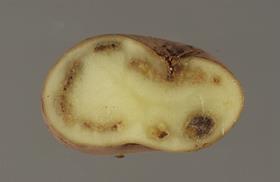
The UK government has stepped up its efforts to control the harmful potato disease ring rot.
Confirming the introduction of molecular DNA technology to speed up detection in tubers, The Food & Environment Research Agency (Fera) says it has also introduced new legislation regarding European potato imports into the UK.
Previously, there had only been three outbreaks of ring rot in the UK, and none since 2005, but the first three months of 2013 has seen two recorded incidents: one in imported ware potatoes from Poland and another in contaminated seed stock from the Netherlands.
The new import legislation requires all deliveries of ware potatoes from Poland and Romania, plus Spain and Portugal, to be notified in advance to Fera's Plant Health and Seeds Inspectors (PHSI) division. Furthermore, all importated Polish potatoes must be accompanied by a ring rot test certificate from the Polish Plant Health Authority. Fera says that these measures will also help its scientists to detect potato imports that are contaminated with the Epitrix flea beetle, aharmful foreign potato pest.
“As imports of ware and seed potatoes have risen following the shortfall in the UK harvest last year, the risk posed by this potentially devastating disease has heightened,” warned Derek McCann, principal plant heath and seeds inspector at Fera.
Described as a ‘cheesy rot’, potato ring rot yield losses are caused by tuber rotting and in individual US crops losses have been as high as 50 per cent.McCann said that the disease could easily cause just as much damage to the UK potato industry.
He concluded: “Processors and traders importing large quantities of potatoes this year should be aware of the ring rot risk involved and take care with sources. Apart from the threat to the home potato industry, failure to meet plant health requirements could cause substantial financial loss to importers if their consignments are delayed or rejected.”



